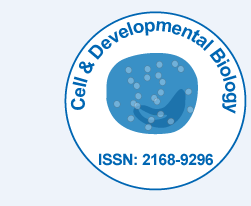
Cell & Developmental Biology
Open Access
ISSN: 2168-9296
+44 1478 350008

ISSN: 2168-9296
+44 1478 350008

Eden Rebecca Padayachee
Department of Neurochemistry
University of Gothenburg, Gothenburg, Sweden
Dr. Eden Rebecca Padayachee is currently a post-doctoral fellow at the Institute of Neuroscience & Physiology in Gothenburg, Sweden. She received her Ph.D in Medicinal Biochemistry from Rhodes University, South Africa and possesses over 5 years of experience in enzymology, amyloid-beta aggregation and biomarker discovery. The title of her dissertation was ?biochemical mechanisms of Alzheimer?s disease.? She is a scientific discoverer and innovator and was commented on by a thesis examiner, who said off her ?This candidate?s discovery could be very important in the Alzheimer?s field and may be the most impactful result of this work. She should be complimented on her methodological expertise and tenacity.? She was recently selected as one of the top 15 candidates out of 300 to attend a 5 day boot camp at the BioMed-X GmbH in Heidelberg, Germany, targeting tau-mediated neurodegeneration in Alzheimer's disease. Her objective is open up her own pharmaceutical company specializing in biomarker discovery, related to enzymes as biosensors and the use of nanovehicles e.g. endogenous protein or lipid based particles that have regenerative properties. Her hobbies include writing a book entitled ?How to become a visionary and be your own catalyst for positive change right now?. She is a master at writing her own powerful quotations to inspire others to reach their full potential. She has been personally invited as guest speaker at the Alzheimer?s Association, UK; International Woman?s Club, Sweden and neuroscience conferences in South Africa, Thailand, China, America and Denmark, resulting in the creation of a global knowledge hub in Alzheimer?s research and innovative therapeutic strategies.
Dr. Padayachee’s passion is ENZYMES! She absolutely loves figuring out enzyme mechanisms, catalysis, kinetics and their function. As a structural biochemist and enzymologist, she enjoys studying enzyme-ligand binding, by using a suite of computational docking software e.g. AutoDock. Biological thermodynamics, spectroscopy, spectrofluorimetry, surface plasmon resonance, electron microscopy are some of the techniques she has used in studying ligand binding phenomena. She strongly believes that enzyme-ligand binding is the basis for future drug discovery as how proteins bind and their subsequent conformational changes are the keys to unlocking the design of therapeutic agents to target protein misfolding diseases. Amyloid fibrils and neurofibrillary tangles are hall marks of Alzheimer’s disease. In her Ph.D thesis she developed new therapeutic strategies in the diagnosis of Alzheimer’s disease by investigating the potential of the enzyme nitric oxide synthase as a catalyst for amyloid fibril formation. She discovered that nanoparticles reverse amyloid fibril formation. Her current position as a post doctorate focused on identifying high density lipoprotein (HDL) particles in cerebrospinal fluid and its effect on reducing amyloid aggregation in AD. Amyloid beta and Tau has been found to interact and form a complex at the synapse. A small molecule inhibitor that prevents the formation of this complex is ideal. She would like to apply the use of endogenous HDL as a “disaggregating agent" to block this complex from forming in the first instance. Targeting the clearance of Aβ and Tau simultaneously affords a combination therapy approach that could be very promising in the field of AD. She believes that imagination is more creative than knowledge and enjoys stimulating innovative thought in young minds by encouraging scientists to step out of their comfort zone and seek challenges at the interface between academia and industry.